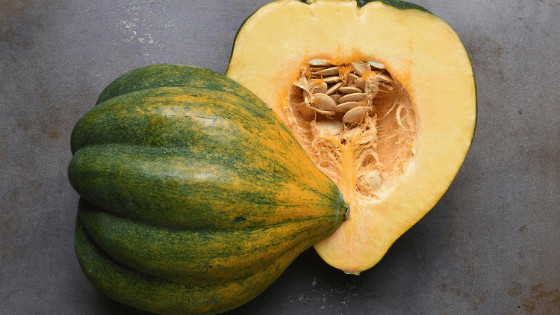
21 Sep Health Benefits Of Acorn Squash
Can’t you tell this week I’m diving all into the health benefits of fall favorite vegetables like acorn squash?! I’m sure you’ve seen this squash before. It’s yellow/orange inside, but outside it can be a dark green on the outside. It actually reminds me of a green pepper + a pumpkin together. Is that weird? Maybe that’s just me.
It harvests in the fall + you’ll see acorn squash recipes popping up on Pinterest everywhere. Sometimes it can be intimidating using a vegetable that you don’t use much, since acorn squash is really only around in the fall time. But, I’m going to highly recommend to step outside of your cooking comfort zone this fall and use this veggie!
Acorn Squash Nutrition
To start with the macronutrients, it’s definitely a starchy vegetable. A good whole-food carbohydrate source, but also has a decent amount of fiber to slow down the absorption of carbohydrates. Acorn squash is loaded with….
- Vitamin C
- Beta-Carotene (Turns into vitamin A in your body once enzymes break each beta-carotene down into two vitamin A)
- Folate
- Magnesium
- Calcium
- Potassium
- Phosphorus
- Omega-3 + 6 (The ratio between the two is good!)
Vitamin C is needed inside our fighter immune cells, such as the T-Cells + phagocytes. Without vitamin C (or a lack of), your body isn’t going to be able to fight efficiently against common colds + other illnesses. I covered in the pumpkin blog about the importance of magnesium + explaining how many of us are deficient in it + also covered the importance of one of our body’s major electrolytes, potassium.
Since acorn squash is a good source of folate, this can be an ideal food for pregnancy or women that are trying to conceive. Most women should be focusing on nutrition BEFORE pregnancy when possible, since most of the neural development of the baby happens in the first weeks before a woman would know she was pregnant.
Birth control pills is VERY common in our women’s medicine cabinet nowadays to prevent pregnancy, but birth control is a medication that MAJORLY depletes our levels of folate. Many women get off of birth control when they are ready to start trying for a baby, but have a very depleted folate status. Folate is a B vitamin that helps the growth + development of the baby (as well as yourself) + can reduce the risk of birth defects. Getting as many vitamins + minerals from real food sources, such as acorn squash, can set you up for a healthy + happy pregnancy!
How To Eat Acorn Squash
Acorn squash is pretty versatile to use! You can skin it + chop it up into bite size pieces. Our favorite ways are bake it or sautée it. One very common way to use acorn squash is to cut it in half + leave the skin on. Then, you take out the seeds in the middle and fill it with a variety of more vegetables, gluten-free grains like rice, and chicken or grass-fed beef. I mean the ideas are endless – especially if you’re on Pinterest.
Here is one of our FAVORITE recipes – Stuffed Acorn Squash!
Share with me some of your favorite acorn squash recipes here or tag us @nuvitruwellness on Instagram + Facebook – we’re always looking for more to try! XO


